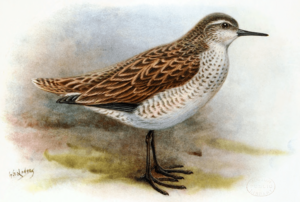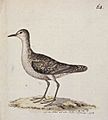Christmas sandpiper facts for kids
Quick facts for kids Christmas sandpiper |
|
|---|---|
 |
|
| 1907 illustration by George Edward Lodge | |
| Conservation status | |
| Scientific classification |
|
| Kingdom: | Animalia |
| Phylum: | Chordata |
| Class: | Aves |
| Order: | Charadriiformes |
| Family: | Scolopacidae |
| Genus: | Prosobonia |
| Species: |
†P. cancellata
|
| Binomial name | |
| †Prosobonia cancellata (JF Gmelin, 1789)
|
|
| Script error: The function "autoWithCaption" does not exist. | |
| Synonyms | |
|
Tringa cancellata Gmelin, 1789 |
|
Script error: No such module "Check for conflicting parameters".
The Christmas sandpiper (also called the Kiritimati sandpiper) was a small shorebird. It became extinct sometime in the early 1800s. This bird was special because it was found only on Christmas Island. This island is now part of Kiribati.
We know about the Christmas sandpiper from only one drawing and one description. These were made by William Wade Ellis and William Anderson. They were part of Captain James Cook's third trip around the world. Cook's team visited Christmas Island from December 24, 1777, to January 2, 1778.
Contents
What was the Christmas Sandpiper?
The Christmas sandpiper (scientific name: Prosobonia cancellata) was a type of small bird. It lived near the water, like other sandpipers. It was about the size of a small robin. We don't have many details about its life. This is because it disappeared so long ago.
Why did it disappear?
The exact reason the Christmas sandpiper became extinct is not fully known. It likely happened after people started visiting Christmas Island more often. New animals brought by humans, like rats, could have eaten the birds' eggs or chicks. Changes to their habitat might also have played a part.
How do we know about this bird?
The Christmas sandpiper is known from a single drawing and a written description. These were made during Captain James Cook's third voyage. The ship, HMS Resolution, stopped at Christmas Island in 1777-1778.
The first drawing
The drawing was made by William Wade Ellis. He was a surgeon's mate on Cook's ship. He was also a talented artist. His drawing is the only picture we have of this bird from when it was alive.
The first description
The description was written by William Anderson. He was a naturalist on the same voyage. A naturalist studies plants and animals. Anderson wrote down details about the bird's appearance. This helped scientists understand what it looked like.
Naming the Christmas Sandpiper
The Christmas sandpiper was officially described in 1789. This was done by a German scientist named Johann Friedrich Gmelin. He gave it the scientific name Tringa cancellata. Later, it was moved to a different group of birds called Prosobonia.
What does its name mean?
The second part of its scientific name, cancellata, comes from a Latin word. It means "trellis-like" or "lattice-like." This might refer to the patterns on its feathers.
Images for kids
 | James Van Der Zee |
 | Alma Thomas |
 | Ellis Wilson |
 | Margaret Taylor-Burroughs |



